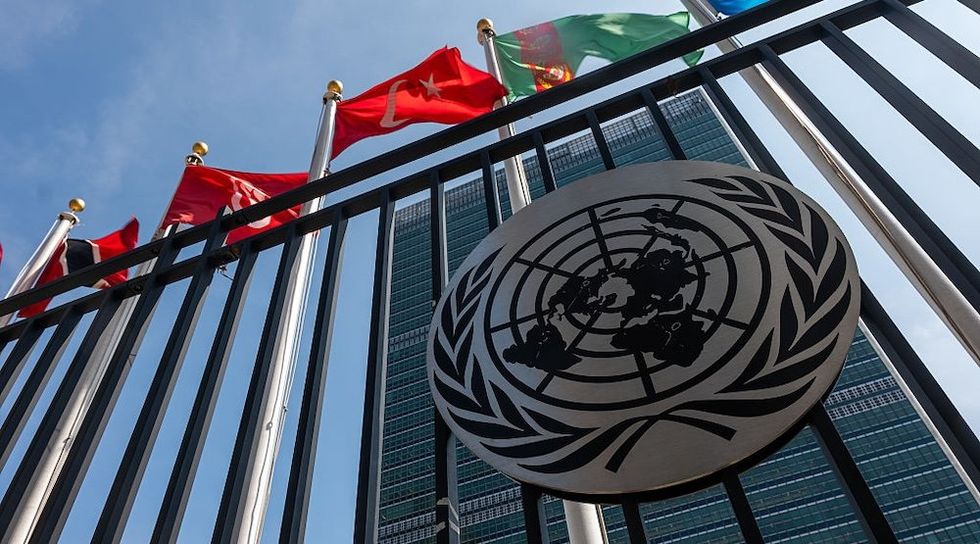President Donald Trump has reached his “tear down this wall” moment.
He has a chance to add as many as 27 Muslim-majority or Muslim-plurality nations to the Abraham Accords. That achievement would not only transform the Middle East but also counter the pro-Hamas intifada gaining ground in the United States.
A wave of Accords signings would not only reshape the Middle East but also serve as the modern echo of Reagan’s challenge in Berlin 40 years ago: ‘Mr. Gorbachev, tear down this wall.’
Twenty-one countries appear ready to sign, with another six possible candidates. Seventeen others remain unlikely for now, but shifting regional dynamics could bring them around.
A post-theocratic Iran would almost certainly reverse course, and with President Recep Tayyip Erdoğan on shaky ground, Turkey is also ripe for realignment. If those two regional powers shift, the rest would likely follow.
Creating momentum
Trump can start that domino effect the way he always has — through showmanship. A steady pace of new signings, one every few months, would keep the Accords in the headlines for the rest of his term.
Each signing should be staged as a major event: dramatic visuals, maps showing the expanding bloc, and messaging that frames the Accords as the new global mainstream.
The most significant prize would be Saudi Arabia. If Crown Prince Mohammed bin Salman joins, the Saudi Islamic establishment would face enormous pressure to either endorse or remain silent. Mosques and Islamic groups worldwide that depend on Saudi support would hesitate to denounce Riyadh as apostate.
But the United States need not wait on the Saudis. The crown prince has already signaled interest. Washington can make the path warmer and quicker.
First signings
Kosovo is an obvious candidate. It quietly became an Accords partner in 2021, even pledging to open an embassy in Jerusalem. But the Muslim-majority European nation never got proper recognition. A joint signing with Egypt and Jordan — both of which already have peace treaties with Israel but have not formally joined the Accords — would spotlight Kosovo and broaden the coalition.
Azerbaijan would be another strong addition. With a Shiite-majority population and Turkic identity, it could challenge both Iran’s Shiite regime and Erdoğan’s pan-Turkic and neo-Ottoman ambitions. If Kazakhstan, Uzbekistan, Turkmenistan, and Kyrgyzstan followed, the message would be unmistakable: Turkey’s Islamist regime does not speak for the Turkic world.
Indonesia, the world’s largest Muslim-majority nation, remains likely as well. Its late former president Abdurrahman Wahid promoted a vision much like the Accords, and his movement still carries weight.
Regional anchors
Some countries already involved carry enormous clout. Egypt, the largest Arab nation, has loudly called for modernist Islamic reform. Jordan controls Jerusalem’s holy sites, giving it symbolic weight. The United Arab Emirates is the model most young Arabs want to emulate. Morocco trains imams abroad, shaping Islamic leadership far beyond its borders.
Others, like Bahrain, Sudan, and Oman, tightly regulate Islamic preaching and will show little tolerance for clerics who denounce peace deals.
The Accords should also welcome affiliates beyond traditional borders: Iraq’s Kurdistan Regional Government, Somaliland, or even respected religious leaders like the Hebron sheikhs who want to join as a Palestinian emirate separate from the Palestinian Authority. Every addition broadens the map and amplifies momentum.
RELATED: UN showdown will decide if the Abraham Accords are built to last
 Photo by Spencer Platt/Getty Images
Photo by Spencer Platt/Getty Images
Peace abroad and at home
To maximize this opportunity, Trump should appoint a special envoy with credibility in both faith and politics — someone like Dr. Zuhdi Jasser, a Syrian-American physician, veteran, and Republican congressional candidate who has long fought Islamism and built interfaith coalitions.
Expanding the Accords isn’t just foreign policy. It’s homeland security. More than 150 extremist groups in the U.S. are feeding anti-Israel narratives and stoking violence. Each new accord, amplified by a strong communications strategy, would undercut their propaganda and show that the tide runs against them.
In Riyadh in 2017, Trump declared from the heart of the Islamic world: “Drive them out!” That call now demands follow-through. A wave of Accords signings would not only reshape the Middle East but also serve as the modern echo of Reagan’s challenge in Berlin 40 years ago: “Mr. Gorbachev, tear down this wall.”
The post Trump’s Berlin Wall moment for the Muslim world appeared first on TheBlaze.




